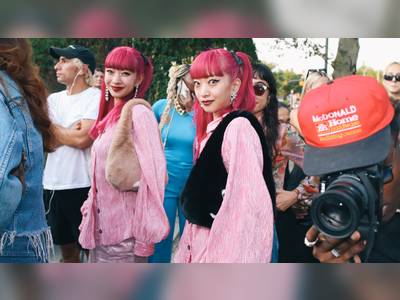The reality series genre exists to be hated -- for the most part.
Topping a very short list of exceptions is Bravo's "Project Runway."
Mentioning that show makes hearts soften and stimulates intelligent
debate over form, originality or, say, whether Season 3 winner Jeffrey
Sebelia deserved to win over Uli Herzner, or if Season 2's enfant terrible, Santino Rice, was robbed.
Simply tell someone "Project Runway" kicks off its new season this week and they'll likely sigh with relief and cry, "Thank God!"
"Project Runway" is and has always been the thinking person's reality series without being snobbish about it. It's couture programming with a ready-to-wear sensibility. Everybody from the T-shirt-wearing, Pabst-guzzling dude slumped on the couch to the Prada-toting, Moet-sipping fashionista perched in her barrel chair enjoys it without shame. The art world and the fashion industry love and respect it.
Nevertheless, critics and viewers pestered Bravo reps for a Season 4 premiere date month after month since the third-season finale aired more than a year ago. Few series delays touch off such a level of frustration.
Tim Gunn, "Runway's" beloved mentor and, beginning this season, chief creative officer for Liz Claiborne Inc., assures viewers that Season 4 was worth the wait.
"The pool is the best yet," he said during a visit to Seattle earlier this year. "We could have cast three seasons from this group. That's how strong it is.
"With each successive season, I certainly learn more about what won't work on the show. And (in the auditions) we had a huge number of staggeringly proficient pattern makers, construction people," he said. "Their clothes looked like they were made by angels, but they were just clothes. There was no fashion to them. ... We're looking for designers. In those that we've selected, we have both."
If that's true, we might be in for the best season of what is the best reality series on television.
That assertion is based on equal parts faith and guesswork; only the first episode was sent out for review and, for the sake of maintaining surprise, won't be discussed in depth here. It's not a farfetched notion, though, if you consider what makes "Project Runway" extraordinary television.
You can say that only about a few "American Idol" winners, but in "Runway" it's true of most of the contestants, even those who don't make the final three. Skill is one thing, but it takes an unusual level of drive and discipline to crank out stunning designs under deadline pressure.
Another aspect the two series have in common is that contestants have a better chance of launching a successful career by virtue of having been on the show. Winning helps, but it's not required. A great example is Emmett McCarthy, eliminated in the midst of Season 2. McCarthy launched a New York boutique, EMC2, featuring his designs as well as clothes by Kara Janx, Nick Verreos and Chloe Dao. Gunn said it was making a profit within six months.
"The store is stunning," Gunn reported, "and he's thinking even more ambitiously now."
That's worth its weight in platinum in a medium lousy with people starved for attention but short on talent using the likes of "Survivor" as their entry to celebrity. Jonny Fairplay will never be a big movie star -- but it's within the realm of possibility that "Runway" could one day yield the next Vera Wang or Zac Posen.
"The biggest compliment that the show can possibly have is that seasoned designers see the show as a positive vehicle, one that can really help them take their career to the next level," Gunn said.
This brings up a factor some might see as a downside following the victories of Dao and Sebelia, two designers with established careers. Gunn believes we will see fewer unknown prodigies and more established designers in seasons to come. And, he added, that's a positive change from where the series began.
"When we were establishing criteria for the designers, ... Jeffrey would have been disqualified. He had too big of a business," Gunn said. "But as we moved forward and we saw who was coming forward, we thought, 'We want this kind of designer.' And for Season 4, we're going to have more. I suspect, just given the pool, we'll have more where there is some name recognition in small circles. Certainly not nationally, but in some small circles there will be designers people will know."
They happen to make good TV anyway, but that's beside the point. A designer's ego may be monstrous, and her personality endlessly entertaining, but if she doesn't show the right stuff in the sewing room, judges Michael Kors, Nina Garcia and host Heidi Klum will see her "auf'd" before anyone remembers her name.
Of course, it's no coincidence that two out of the three "Project Runway" winners, Sebelia and Jay McCarroll, have been divas. Add the other finalists to the pair and that number expands. Wallflowers and mice do not cut a swath in the fashion world. But overall, "Runway" has proved that what counts is individuality of vision, the ability to entice the fashion consumer with something we've never seen.
The premiere showed a few early signs of greatness from a handful of the designers; you'll have to watch to find out to whom I'm referring. But be careful of placing your bets too early. After several seasons of being floored by the works of Kara Saun, McCarroll, Rice, Daniel Vosovic, Sebelia, Herzner, Laura Bennett and Mychael Knight, the current crop of designers has a greater challenge to overcome than the ones Klum, Garcia and Kors make them rip through each week.
We're confident they'll make it work.













